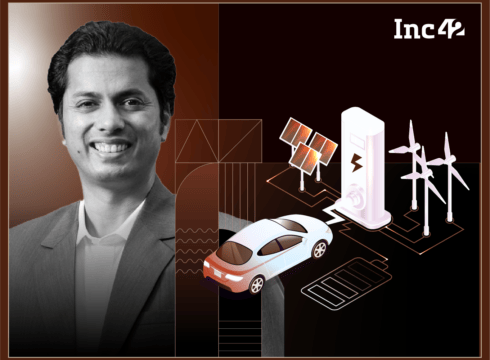Agarwal said India's battery production capacity is only slated to grow to about 30-40 Gwh
During the Money X session, the panellists concurred that EV adoption in India is a long task and would see emergence of small, local scale players across the country
Earlier this month, the government awarded production-linked incentives for 10 GWh of advanced chemistry cell manufacturing to four entities, which include Reliance Industries, Reliance Energy, Ola Electric and Rajesh Exports
Inc42 Daily Brief
Stay Ahead With Daily News & Analysis on India’s Tech & Startup Economy
With ‘electric vehicle’ emerging as a buzzword in the Indian automobile space, early stage venture capital firm’s partner Arpit Agarwal believes that India has a long road ahead.
Speaking at a panel discussion during Inc42’s Money X, Agarwal said that the country’s EV capacity is about 20 years behind China.
“India’s electric vehicle capabilities are years behind China’s dominant position in the space. While China’s electric vehicle cell production capacity is somewhere north of 500 Gwh, India’s battery production capacity is only slated to grow to about 30-40 Gwh. Our battery manufacturing capabilities can only grow further if our dependencies for critical minerals used in production come down,” he said during the session.
The comments come at a time when the country is just seeing the installation of EV battery factories. Earlier this month, the government awarded production-linked incentives for 10 GWh of advanced chemistry cell (ACC) manufacturing to four entities. The entities include Reliance Industries, Reliance Energy, Ola Electric and Rajesh Exports.
The union cabinet approved the PLI scheme for manufacturing ACC batteries in May 2021 to boost India’s electric mobility and battery storage capabilities. The scheme has an outlay of INR 18,100 Cr to achieve manufacturing capacity of 50 GWh of ACC and 5 GWh of “niche” ACC.
Besides this, the Centre also announced customs duty exemption on 25 critical minerals, including cobalt, lithium, copper, which are essential for EVs. Commenting on the government push, Agarwal believes that more subsidies likely for EVs as shifting to electric mobility is a priority for India considering the high oil import bill.
Besides Agarwal, the panel discussion also featured Hero MotoCorp’s Nitai Utkarsh, India Early Stage Fund’s Anup Jain and Inc42’s senior editor Nikhil Subramaniam.
During the panel discussion, the panellists concurred that EV adoption in India is a long task and would see emergence of small, local scale players across the country. One of the major reasons behind this is the fact that there are multiple tech infrastructures required throughout the production of an electric vehicle.
Expanding on Hero’s EV investment strategy, Utkarsh said that the company looks at investing in smaller companies that plug in critical gaps in the EV manufacturing cycle.
Note: We at Inc42 take our ethics very seriously. More information about it can be found here.


